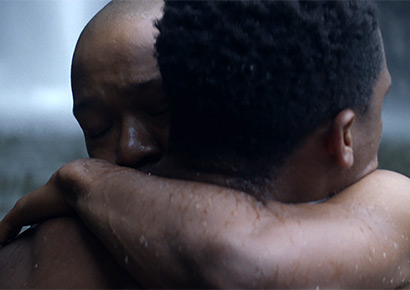Questions asked as Dali Mpofu defends Inxeba ban in court
 EFF National Chairperson and advocate Dali Mpofu has argued that Inxeba (The Wound) should be banned from cinemas in South Africa.
EFF National Chairperson and advocate Dali Mpofu has argued that Inxeba (The Wound) should be banned from cinemas in South Africa.
Questions have been asked why Mpofu, who represents a party that claims to support LGBTQ equality, has chosen to champion the homophobic campaign against the acclaimed gay love story.
The producers of the film earlier challenged the X18 classification imposed by the Film and Publication Board’s Appeals Tribunal (FPBAT) last month. The rating was temporarily changed to a lower 18 classification (without the ‘X’) by the courts, allowing the film to return to cinemas in the meantime.
On Wednesday, Inxeba’s producers, the FPBAT, and the cultural organisations that backed the ban, gathered in the North Gauteng High Court in Pretoria to present their arguments for and against the X18 rating for a final ruling on the matter.
Representing the traditional leaders organisation Contralesa, Mpofu argued that the film’s sex scenes were indeed explicit (they are not, and no genitals are shown), and warned that depicting the sacred initiation rituals threatened the continued existence of the Xhosa culture.
He also insisted that the criticism of the film is not based on homophobia and that no sex of any kind, homosexual or heterosexual, should take place or be shown taking place within the initiation context.
Mpofu further said that Inxeba could cause harm to young people by depicting sex within this environment and by also not detailing the circumcision process accurately.
Advocate Steven Budlender, who’s representing the producers, responded that the film was a work of fiction and not a documentary.
Budlender also told the court that the producers and the film’s researchers interviewed over 400 men about their stories related to their initiation experience and found that many said they’d engaged in sex or were propositioned for sex during that time.
Judge Joseph Raulinga asked Budlender how he would respond to the idea of cutting out the three sex scenes in the film. Budlender replied that without these scenes the film would not make sense and “it would destroy the extraordinary ending”.
The question of Mpofu’s role in defending the film’s ban came up on social media, with many expressing their disappointment and anger.
“I wish Dali can recuse himself from this case. Its painting a bad picture for the EFF,” said one person, while another tweeted, “It’s cute that folk want us to understand that Dali Mpofu is doing his job, when his current job means silencing and invalidating our stories, our lived experiences. We have a right to cancel him. Allow us.”
Another commentator said: “He’s the Chairman of a political party at the forefront of advocating economic freedom. What’s economic freedom without inclusivity? Or are some freedoms more important than others…”
The DA is the only political party to have come out publicly against the attempted ban of Inxeba as a threat to freedom of expression for the LGBTQ community and South Africa as a whole
Judge Raulinga reserved judgement in the case and promised to hand down a ruling as soon as possible.
Inxeba is the story of Xolani, a lonely closeted Xhosa factory worker who joins the men of his community in the mountains of the Eastern Cape to initiate a group of teenage boys into manhood. There he meets up with the man he is in love with.
I wish Dali can recuse himself from this case. Its painting a bad picture for the EFF.
— Monwana Thaoga (@geesum) March 28, 2018
@AdvDali_Mpofu only cultural fregile people will support this banning of #Inxeba. I suppose #EFF will loose votes cos of you
— Nipho (@nhlakagreg) March 28, 2018
He’s cancelled, and by virtue of association, so is @EFFSouthAfrica
He’s the Chairman of a political party at the forefront of advocating economic freedom. What’s economic freedom without inclusivity? Or are some freedoms more important than others @AdvDali_Mpofu ?
— Bassito Panache (@BassitoPanache) March 28, 2018
- Facebook Messenger
- Total127
Moral inconsistency is the hallmark of the EFF. The Rolex Revolutionaries led by that famous tenderpreneur and tax dodger Jub Jub Malema
Dali Mpofu had an affair with Madiba’s wife Winnie, that is what caused the divorce. His high profile Oxford graduate son is with an English woman name Walsh who raised him (what citizenship does Sizwe Mpofu Walsh have?)
Now he “is just doing his job”. It’s called the Nuremburg defence.
What utter nonsense. It could threaten the continued existence of the Xhosa culture!! On what planet. Of course Dolly Mpofu was the esteemed great who pre-Hlaudi’d the SABC so one can’t expect that much. If any person actually believes the EFF have any moral compass they need to have their heads examined. It’s a movie. Like so many things in life if you don’t want to see some Xhosa blokes get circumcised and get it on (or vice versa) then you don’t go and watch the movie. South Africans leave freedom and democracy as long as it’s their freedom and democracy.